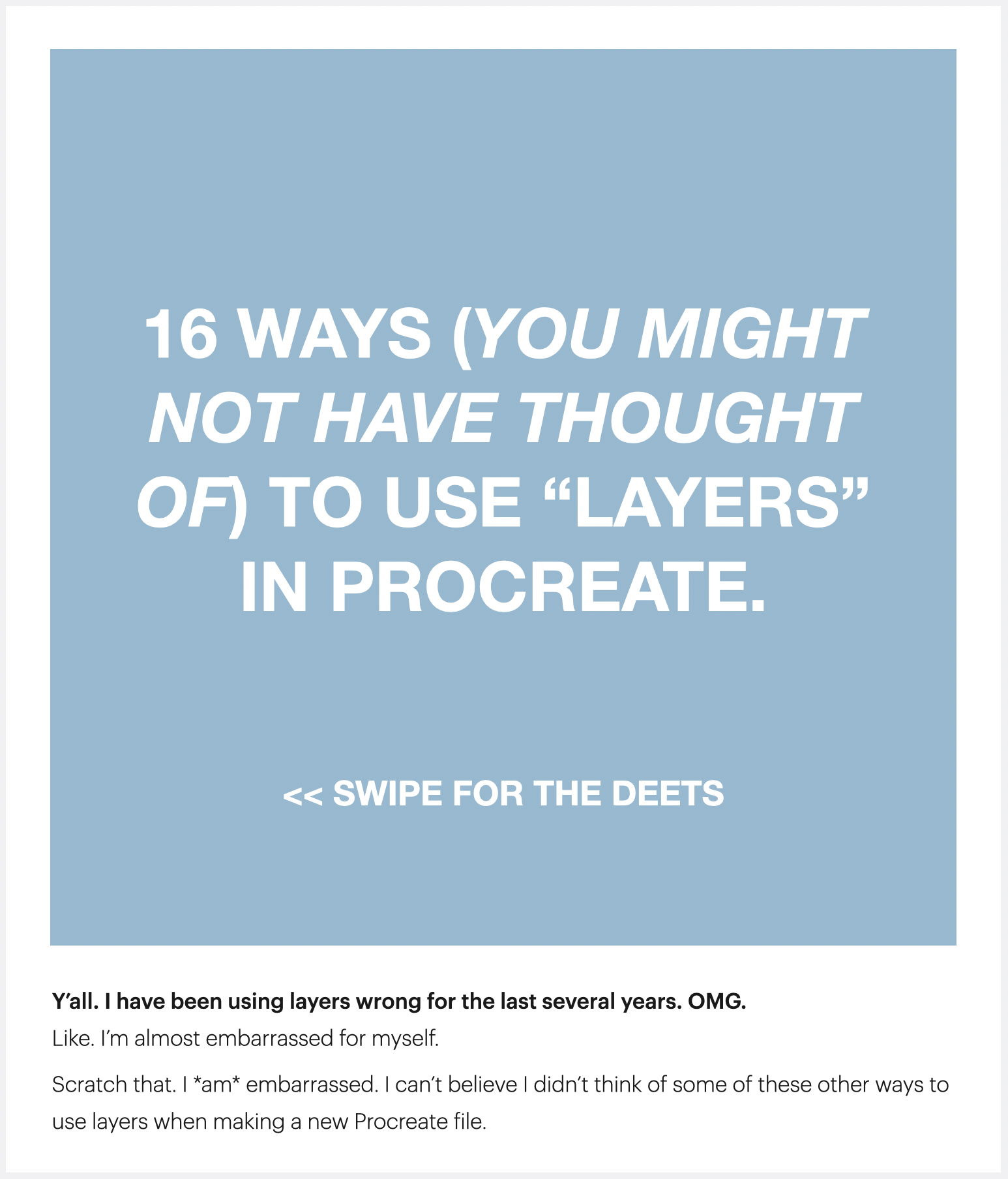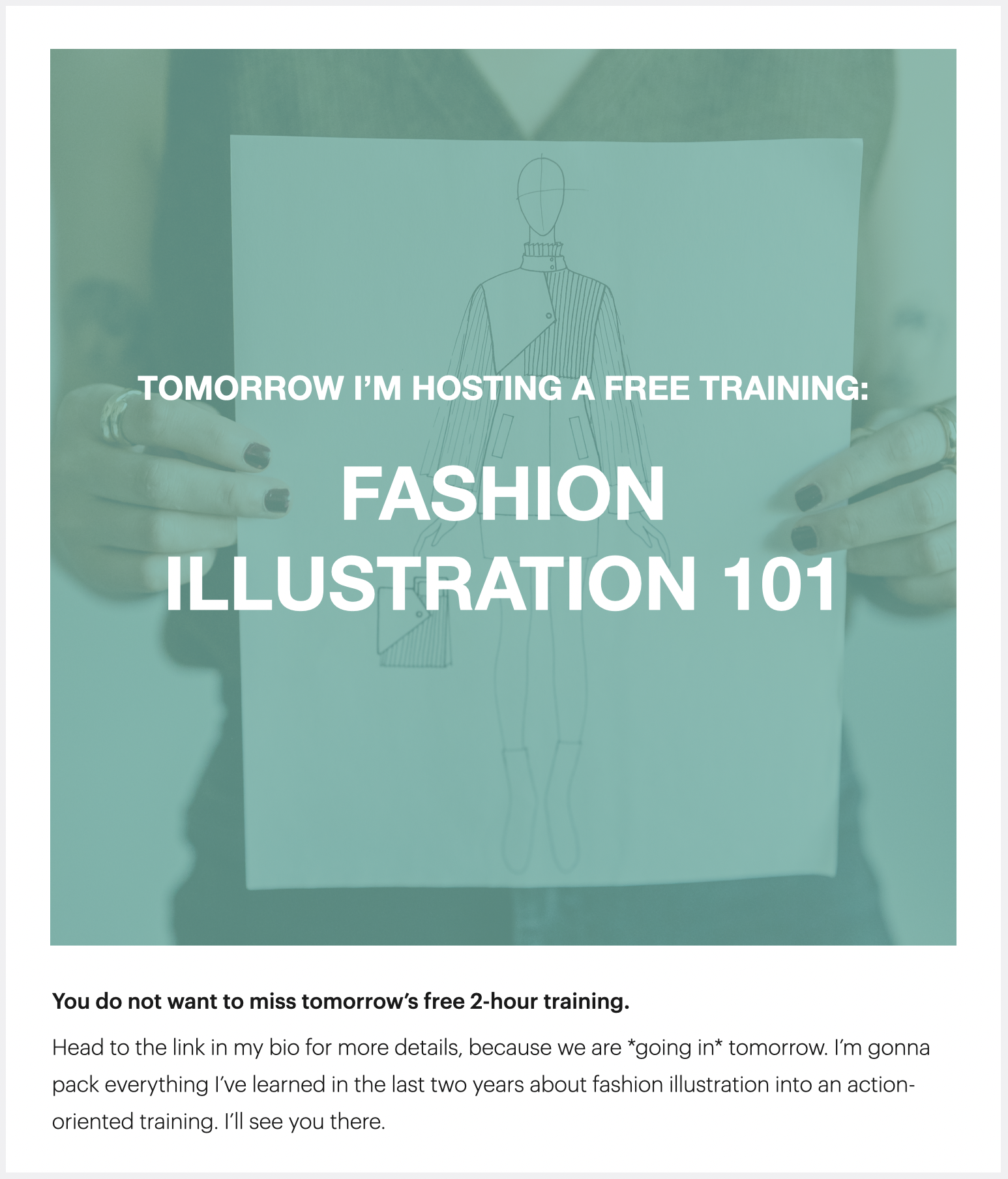Note: these are not real posts; they are stock images with captions I made up to highlight what I mean by “expert” or “know-like-trust” content.
Wait, this content is educational and helpful. What’s the problem?
The short answer: nothing—as long as your business model is selling DIY educational content at a low or mid-range price and using a ton of free educational content to prove how helpful you are so that people will eventually buy from you. If you sell low-ticket products that aren’t educational (ex: toaster ovens, facial serums, certain software), influencer content marketing might be a better use of your time.
If you sell higher-ticket DIY (or done-with-you & done-for-you) programs that are not only educational, but that also help people change their thoughts and behaviors, expert content marketing is often not “enough” to draw your ideal clients in. So, oftentimes, you end up doing the most to “prove” yourself to clients, and it doesn’t feel good.
Let’s dive in further below.
You’ve likely come across a lot of content like this before in multiple industries or niches.
Okay, so we covered influencer content marketing already (bottom-left spot in our matrix), now it’s time to go over expert content marketing (top-left).
Expert content marketing claims its spot in the matrix because:
It’s all about educational content.
Coaches and consultants want to be helpful . . . and prove that they know what they’re talking about. What better way to do that than to publish tons and tons of educational content?
Honestly, it seems like the obvious answer. So how does it go wrong for so many people? People who are doing the most meaningful work they can think of. People who feel like what they do is a calling, not a temporary career.
The gist is this:
Since educational content gives people new facts (as in: it helps you know something extra that you didn’t necessarily know before), people’s most common reaction to educational content is to watch/read/listen and feel like they’ve learned something they can put to use in the future.
Sometimes people bookmark the content to come back to later. Only ever so rarely will a person actually stop what they’re doing and try out what the educational content is suggesting right then and there.
So, ehh, the best-case-and-most-likely scenario is a person feels like they’ve gained something they’ll use later . . . and they keep collecting items like that.
And since they’re collecting educational items from you (and let’s be real: your competitors as well), why would they need to buy your online course? And they’re certainly not likely to buy high-level coaching from you . . . after all you’re that person who always comes with the “free value” 🙄.
So yeah, when people say business is a “number’s game” . . . this is what they’re talking about. They’re talking about using an inefficient style of content marketing—but as long as you get it in front of enough people, a certain percentage will buy. Hence: a number’s game.
The reason so few people buy deeper offers from expert content marketing is that educational content doesn’t inspire or require change and action.
Your potential customer can keep collecting knowledge/facts until the end of time and never use them. Gaining new facts inspires collection. People feel smarter without having to actually try out what you said.
Transformational content (which we’ll talk about in Part 4 of this guide) gives people the feeling of being a new person. It inspires them to think in new ways, which is the most important precursor to acting in new ways. Transformational content reshapes how a person thinks of themselves, their actions, and their goals in the larger landscape. They understand their role differently and are changed by your ideas. Transformational content requires change and action, so people are much more likely to invest in your help.
Expert (know-like-trust) marketing lands in the top-left position of the matrix because the best case scenario is that people try out what you share in your content, but the best-and-most-likely reaction is “knowledge or fact collection.”
So: the content is designed to be empowering (and is indeed empowering for the people who try it out), and you create it with the hopes people will actually spend real time with it (not just click like and keep it moving) . . . but you have to post frequently since people aren’t likely to take action on something life-changing or meaningful the first, tenth, or fiftieth time they collect educational content from you, so you keep your prices low- to mid-ticket to encourage sales.
Your business model and marketing model are intertwined—they are linked in a way where one directs the other and vice versa.
If we create posts like these, it will take a long time before people know, like, and trust us enough. A long time before people implement what we’re sharing . . . and when they do implement . . . it will take a long time and lot of content for them to think they need our deeper offers.
So whereas some posts like the ones above will be okay for a person pursuing high-impact work, creating most of your posts in this style of marketing is not your best bet. Let’s talk about another type of content marketing that people often turn to when they want to increase sales (hint: you might have a strong aversion to this 3rd type).
The most common outcome of both expert content marketing (know-like-trust) and influencer content marketing (want-follow-get) is forgettable content that lacks impact and competes against a large quantity of similar content.




